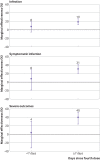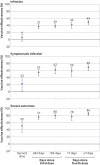Effectiveness of a fourth dose of covid-19 mRNA vaccine against the omicron variant among long term care residents in Ontario, Canada: test negative design study
- PMID: 35793826
- PMCID: PMC9257064
- DOI: 10.1136/bmj-2022-071502
Effectiveness of a fourth dose of covid-19 mRNA vaccine against the omicron variant among long term care residents in Ontario, Canada: test negative design study
Abstract
Objectives: To estimate the marginal effectiveness of a fourth versus third dose and the vaccine effectiveness of mRNA covid-19 vaccines BNT162b2 and mRNA-1273 against any infection, symptomatic infection, and severe outcomes (hospital admission or death) related to the omicron variant.
Design: Test negative design.
Setting: Long term care facilities in Ontario, Canada, 30 December 2021 to 27 April 2022.
Participants: After exclusions, 61 344 residents aged 60 years or older across 626 long term care facilities in Ontario, Canada who were tested for SARS-CoV-2 were included.
Main outcome measures: Laboratory confirmed omicron SARS-CoV-2 infection (any and symptomatic) by reverse transcription polymerase chain reaction (RT-PCR), and hospital admission or death. Multivariable logistic regression was used to estimate marginal effectiveness (four versus three doses) and vaccine effectiveness (two, three, or four doses versus no doses) while adjusting for personal characteristics, comorbidities, week of test, and previous positive SARS-CoV-2 test result more than 90 days previously.
Results: 13 654 residents who tested positive for omicron SARS-CoV-2 infection and 205 862 test negative controls were included. The marginal effectiveness of a fourth dose (95% of vaccine recipients received mRNA-1273 as the fourth dose) seven days or more after vaccination versus a third dose received 84 or more days previously was 19% (95% confidence interval 12% to 26%) against infection, 31% (20% to 41%) against symptomatic infection, and 40% (24% to 52%) against severe outcomes. Vaccine effectiveness in vaccine recipients (compared with unvaccinated) increased with each additional dose, and for a fourth dose was 49% (95% confidence interval 43% to 54%) against infection, 69% (61% to 76%) against symptomatic infection, and 86% (81% to 90%) against severe outcomes.
Conclusions: The findings suggest that compared with a third dose of mRNA covid-19 vaccine, a fourth dose improved protection against infection, symptomatic infection, and severe outcomes among long term care residents during an omicron dominant period. A fourth vaccine dose was associated with strong protection against severe outcomes in vaccinated residents compared with unvaccinated residents, although the duration of protection remains unknown.
© Author(s) (or their employer(s)) 2019. Re-use permitted under CC BY-NC. No commercial re-use. See rights and permissions. Published by BMJ.
Conflict of interest statement
Competing interests: All authors have completed the ICMJE uniform disclosure form at https://www.icmje.org/disclosure-of-interest/ and declare: support from the Applied Health Research Questions Portfolio at ICES, which is funded by the Ontario Ministry of Health, for the submitted work, and no financial relationships with any organisations that might have an interest in the submitted work in the previous three years. SEW is a member of Canada’s National Advisory Committee on Immunization (NACI) and APC is a member of the Congregate Care Setting Working Group of the Ontario Science Table.
Figures


References
-
- Canadian Institute for Health Information. The Impact of COVID-19 on Long-Term Care in Canada: Focus on the First 6 Months. Ottawa, ON: CIHI; 2021 [cited 2022 Mar 10]. https://www.cihi.ca/sites/default/files/document/impact-covid-19-long-te...
-
- Canadian Institute for Health Information. Long-term care and COVID-19: International comparisons. 2020 [cited 2022 May 19]. https://www.cihi.ca/en/long-term-care-and-covid-19-international-compari...
MeSH terms
Substances
Supplementary concepts
LinkOut - more resources
Full Text Sources
Medical
Miscellaneous
